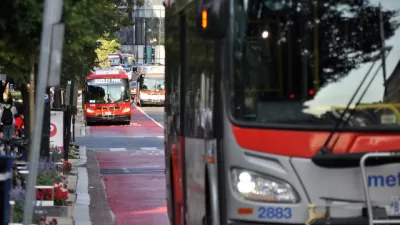Current commuter benefits favor employees driving to work instead of taking public transportation, despite years of advocacy and lobbying efforts in Congress.
In light of New York Democrat Senator Charles Schumer's current attempts to raise commuter benefits from their low levels, Emily Badger of The Washington Post explores some of the implications of this low incentive. As Badger notes, "If you're a driver, the federal commuter benefit allows you to spend up to $245 of your pre-tax income each month on parking at work. If you pay to take the bus or train instead, the benefit is only about half that — $130. For several years now, transit advocates have gone back and forth with Congress trying to equalize the benefits (or remove the bias, depending on how you look at it). And for a brief and glorious period, the Recovery Act (and some extensions) temporarily did that."
Having lower incentives for public transportation than driving makes the commute worse for everyone; it incentivizes more congestion, greater health risks, and longer commute times. The opposite incentive structure, where public transportation benefits are higher (allowing riders to also at least cover the full cost of their commute), improves commute times for drivers, and leads to fewer negative social externalities associated with driving.
According to Badger, the current level of benefits also requires, "commuters who don't use cars to pay what amounts to about $565 more in taxes every year, according to the American Public Transportation Association."
FULL STORY: Congress would rather you drive to work than take public transit

Planetizen Federal Action Tracker
A weekly monitor of how Trump’s orders and actions are impacting planners and planning in America.

Chicago’s Ghost Rails
Just beneath the surface of the modern city lie the remnants of its expansive early 20th-century streetcar system.

San Antonio and Austin are Fusing Into one Massive Megaregion
The region spanning the two central Texas cities is growing fast, posing challenges for local infrastructure and water supplies.

Since Zion's Shuttles Went Electric “The Smog is Gone”
Visitors to Zion National Park can enjoy the canyon via the nation’s first fully electric park shuttle system.

Trump Distributing DOT Safety Funds at 1/10 Rate of Biden
Funds for Safe Streets and other transportation safety and equity programs are being held up by administrative reviews and conflicts with the Trump administration’s priorities.

German Cities Subsidize Taxis for Women Amid Wave of Violence
Free or low-cost taxi rides can help women navigate cities more safely, but critics say the programs don't address the root causes of violence against women.
Urban Design for Planners 1: Software Tools
This six-course series explores essential urban design concepts using open source software and equips planners with the tools they need to participate fully in the urban design process.
Planning for Universal Design
Learn the tools for implementing Universal Design in planning regulations.
planning NEXT
Appalachian Highlands Housing Partners
Mpact (founded as Rail~Volution)
City of Camden Redevelopment Agency
City of Astoria
City of Portland
City of Laramie




























